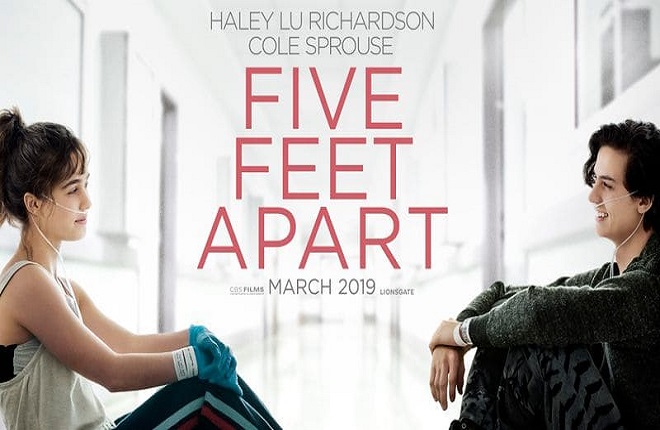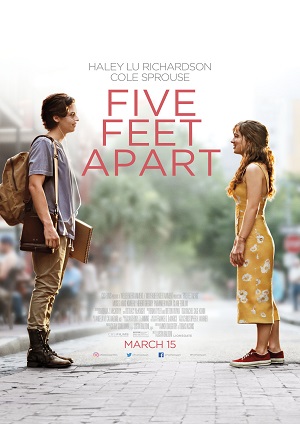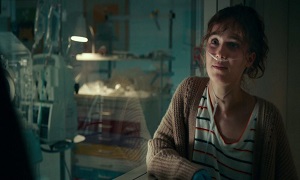Five Feet Apart

 If only Harvey Weinstein abided by the same rule.
If only Harvey Weinstein abided by the same rule.
Cast of Characters:
Stella Grant – Haley Lu Richardson
Will Newman – Cole Sprouse
Poe – Moises Arias
Barb – Kimberly Hebert Gregory
Dr. Noor Hamid – Parminder Nagra
Meredith – Claire Forlani
Director – Justin Baldoni
Screenplay – Mikki Daughtry & Tobias Iaconis
Producer – Cathy Schulman & Justin Baldoni
Rated PG-13 for thematic elements, language and suggestive material.
Stella Grant (Haley Lu Richardson) is a bright, young teenager with a lot going for her in her life. She has BFFs who love her to death, has her YouTube podcast, and has hopes and aspirations she hopes to fulfill one day. One thing holds her back, and it’s a pretty big thing – she has cystic fibrosis, a genetic disorder that affects the lungs mostly, thus confining her to a life of stringent, routine medications and boundaries.
Back at the hospital for what she refers to as a “tune-up”, Stella is able to get through each day with the help of her nurse Barb (Kimberly Hebert Gregory) and longtime friend and fellow CF patient Poe (Moises Arias), but her own little world of meticulous planning and daily routines is shaken and turned upside down the day she meets Will Newman, another CF patient with a devil-may-care attitude and a poor prognosis that requires an experimental drug regimen that isn’t going as well as hoped, and isn’t helped any further by his flippant attitude toward his treatments.
So, naturally, you should see where this is going. They have their little “meet cute”, and over the course of their time at the hospital, Stella’s determined to get Will to focus more on his treatment, and Will’s determined to get Stella to loosen up a little, which isn’t the best idea ’cause given their condition that could mean death… but whatever.
Of course, chemistry ignites and sparks begin to fly between the two. Congrats, Will and Stella. Of all the people you chose to fall in love with, you fall head over heels for someone you can’t be any closer than six feet from. But you know what, they’re gonna say to hell with that. They’re giving their condition the bird and shortening it to five feet apart instead – you know… ’cause through their love… anything is possible.
Your deadly exchange of contagious bacteria might have something different to say about that.
 What would the year at the cinema be without the annual terminal teens in love flick? Much like The Fault in Our Stars or Me and Earl and the Dying Girl, both of which had cancer as their disease of choice, Five Feet Apart is the newest film to have teens with a fatal illness, whose suffering is given an extra hard kick in the gut when they fall hard for each other. This time around, unlike cancer – the popular go-to disease – Five Feet Apart deals with cystic fibrosis, a disease that causes an excess of mucus buildup in the lungs, thereby making breathing extremely difficult and infections, if caught, even harder to fight. Despite a recent surge in popularity, these disease-of-the-week weepies are by no means a new trend. From Nicholas Sparks’s A Walk to Remember (once again, cancer) to Julia Roberts’s battle with “dia-beet-us” in Steel Magnolias, we’ve been getting pummeled by movies that shamelessly yank on our heartstrings like an aggressive game of tug-o’-war for the past thirty years, and long, long, long before all that, William Shakespeare explored love and death (and in a far more tragic manner) with Romeo and Juliet.
What would the year at the cinema be without the annual terminal teens in love flick? Much like The Fault in Our Stars or Me and Earl and the Dying Girl, both of which had cancer as their disease of choice, Five Feet Apart is the newest film to have teens with a fatal illness, whose suffering is given an extra hard kick in the gut when they fall hard for each other. This time around, unlike cancer – the popular go-to disease – Five Feet Apart deals with cystic fibrosis, a disease that causes an excess of mucus buildup in the lungs, thereby making breathing extremely difficult and infections, if caught, even harder to fight. Despite a recent surge in popularity, these disease-of-the-week weepies are by no means a new trend. From Nicholas Sparks’s A Walk to Remember (once again, cancer) to Julia Roberts’s battle with “dia-beet-us” in Steel Magnolias, we’ve been getting pummeled by movies that shamelessly yank on our heartstrings like an aggressive game of tug-o’-war for the past thirty years, and long, long, long before all that, William Shakespeare explored love and death (and in a far more tragic manner) with Romeo and Juliet.
These types of films have one goal: You will either producer a river of tears on your own watching this, or else Sally Field’s ham-fisted, hyper-emotional funeral speech for her sweet Shelby will beat them out of your face until your pathetic, emotionally exhausted self finally gives in and emits a tear.
Nowadays, the trend with these tearjerkers seems to be adaptations of young adult (YA) fiction, as was the case with The Fault in Our Stars, Me and Earl and the Dying Girl, and If I Stay, the one where Chloe Grace Moretz’s ghost wanders around a hospital waiting for her comatose self to wake up. While Five Feet Apart is an original work and not a YA adaptation, it sure does have every bit the same feel of one. Despite the two minutes of mercilessly sentimental cringe produced by the marketing trailers, this film still has the potential to work in a sincere, genuinely affecting manner, and we’ve seen it done before. Both The Fault in Our Stars and Me and Earl and the Dying Girl worked very well thanks to strong casts and writing. Or this film could turn out to be a giant, emotionally manipulative dog turd like If I Stay.
One thing’s for certain – I brought my rain poncho for this screening ’cause with these sort of films that guarantee devastated emotions, every row in the theater is the “soak zone”.
 The Good: For its first two acts, Five Feet Apart is thankfully focused on its characters. The three central characters – Stella, Will, and Moises – are more than just diseased caricatures for us to take pity on and have a good cry over. They are layered and multi-dimensional characters with hopes, fears, flaws and defense mechanisms they have built up within them to cope with the harsh reality that their conditions have them living on borrowed time. While director Justin Baldoni’s efforts here may mostly have a workmanlike feel to the proceedings, one aspect he and his production team do a fine job of is the community-like atmosphere, aided by a variety of fully lived-in details, they provide within the hospital setting, which is the sole setting for about 90% of the movie (another nice technical touch Baldoni provides is the way he frames the intro scenes, leading us to believe it’s just another fun, after-school day for Stella and her best friends, before re-positioning the shot to reveal Stella confined and alone in her hospital room).
The Good: For its first two acts, Five Feet Apart is thankfully focused on its characters. The three central characters – Stella, Will, and Moises – are more than just diseased caricatures for us to take pity on and have a good cry over. They are layered and multi-dimensional characters with hopes, fears, flaws and defense mechanisms they have built up within them to cope with the harsh reality that their conditions have them living on borrowed time. While director Justin Baldoni’s efforts here may mostly have a workmanlike feel to the proceedings, one aspect he and his production team do a fine job of is the community-like atmosphere, aided by a variety of fully lived-in details, they provide within the hospital setting, which is the sole setting for about 90% of the movie (another nice technical touch Baldoni provides is the way he frames the intro scenes, leading us to believe it’s just another fun, after-school day for Stella and her best friends, before re-positioning the shot to reveal Stella confined and alone in her hospital room).
Part of what allows these characters to grow for most of the film is the central device referred to in the title, which is a reference to the guideline from the Cystic Fibrosis Foundation that states CF patients should be kept a minimum of six-feet apart to reduce the risk of cross-infection. Call it a gimmick if you will, but gimmick or not, the distance device forces writers Mikki Daughtry and Tobias Iaconis to build Stella and Will’s relationship through conversation instead of just going for empty intimacy all in a shameless effort to score some “awws” from the audience. It’s this type of respectful treatment that Daughtry and Iaconis are able to earn our care and investment in their characters’ lives.
The standout strength of Five Feet Apart is the performances, mainly from the three teens played by Haley Lu Richardson, Cole Sprouse and Moises Arias (the latter of whom is refreshingly dialed-down for once). Sprouse, who’s gained wide recognition from Adam Sandler fans (Big Daddy), Disney fans (The Suite Life of Zack & Cody) and now the CW’s Riverdale, turns in strong work as the sarcastic cynic Will (despite maybe being asked to brood and smolder a tad more than needed), and helps bring something affecting to the romance, even when bordering on mushy, through the chemistry he shares with Richardson. Richardson, who’s been quietly building a strong calling card of her own with supporting turns in Edge of Seventeen, Columbus and M. Night Shyamalan’s Split, gives a performance that’s nothing short of wonderful. Be it the expressive enthusiasm Stella displays for her podcast or a tragic backstory that she tries so hard to avoid opening up about, Richardson is asked to check off a wide range of emotional beats, and she nails every single one of them pitch-perfectly. Even when the film falters, she continues to shine, and if there’s any positive takeaway from this, it’s that her performance here should warrant her increased recognition.
 The Bad: And then the third-act rolls on up and rears its ugly head at us. All that Five Feet Apart manages to get right is unfortunately undone by a final act that swan dives deep into needless melodrama. I’m not sure if it’s studio interference or Baldoni, Daughtry, and Iaconis’s own decision to blame for jerking the narrative steering wheel hard to the left to fly right off the cliff, but regardless, it’s extremely frustrating to be cheated out of the authentically moving ending the first two acts deserved by way of a series of cheap plot contrivances. To say Daughtry and Iaconis throw in too many coincidences during the film’s climax would be an understatement. They’re slinging them out at the audience at a rate that will leave you every bit as overwhelmed as Lucy Ricardo trying to keep up with the candy conveyor belt in I Love Lucy’s “Job Switching” episode.
The Bad: And then the third-act rolls on up and rears its ugly head at us. All that Five Feet Apart manages to get right is unfortunately undone by a final act that swan dives deep into needless melodrama. I’m not sure if it’s studio interference or Baldoni, Daughtry, and Iaconis’s own decision to blame for jerking the narrative steering wheel hard to the left to fly right off the cliff, but regardless, it’s extremely frustrating to be cheated out of the authentically moving ending the first two acts deserved by way of a series of cheap plot contrivances. To say Daughtry and Iaconis throw in too many coincidences during the film’s climax would be an understatement. They’re slinging them out at the audience at a rate that will leave you every bit as overwhelmed as Lucy Ricardo trying to keep up with the candy conveyor belt in I Love Lucy’s “Job Switching” episode.
I mean, it’s not as bad, but boy, is it bordering dangerously close to Nicholas Sparks territory.
What’s most disappointing is that I sat through Five Feet Apart’s first 90-minute quite surprised, and pleasantly so, at Baldoni’s delicate handling of the material. The first two-thirds provided us with characters that felt real, were worth investing our care and concern in, and the film took its time in developing a meaningful relationship between its romantic leads. But then I guess some dumbass on the set had to raise their hand and suggest that the film might be a total failure if every butt in the theater seats isn’t a complete and total emotional wreck by the end credits, so cue all the unnecessary, overwrought scenarios. Of course, it’s foolish to think no one intended to go for the emotional jugular with this type of film. Tears are expected, but Baldoni’s going for broke by yanking on your heartstrings with the extreme force of a psycho cat going ballistic on the window blinds cord. The result is a wholly unsatisfying conclusion that conflicts with the sensitive approach brought before it and diminishes the emotional weight that had been earned in the prior two acts.
The Ugly: The sea of moviegoers’ tears, of which I nearly drowned in like Mark Wahlberg getting swept away by the raging waters of the Atlantic in The Perfect Storm.
Consensus: Five Feet Apart certainly manipulates emotions like silly putty, and is unfortunately derailed by a ridiculously mawkish third-act; however, strong performances, most notably a terrific, star-making turn from Haley Lu Richardson, provide just enough emotional honesty to elevate it above the Lifetime disease-of-the-week trainwreck it could’ve been.
Silver Screen Fanatic’s Verdict: I give Five Feet Apart a B- (★★½).
